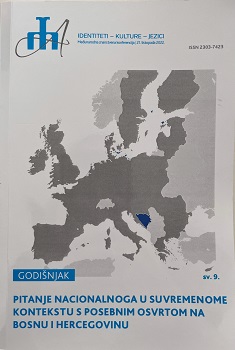Prkosni nacionalizmi dekompozitnoga društva: Razmatranje nacionalnoga u suvremenoj Bosni i Hercegovini
Defying Nationalisms of a Decomposite Society: Consideration of the National in Contemporary Bosnia and Herzegovina
Author(s): Dražen BarbarićSubject(s): Nationalism Studies, Inter-Ethnic Relations, Identity of Collectives
Published by: Filozofski fakultet Sveučilišta u Mostaru
Keywords: cosmopolitanism; situational community; banal nationalism; citizen nation; decomposite society;
Summary/Abstract: The paper examines the phenomenon of national identities and their manifest forms in the contemporary context, with a special focus on the situation in Bosnia and Herzegovina. Namely, in academic circles, nationalism and its associated identity are mainly reduced to a pejorative phenomenon of the 19th and 20th centuries, which is completely inadequate to the newly emerging cultural, sociological and political circumstances. We will try to explain that national identity still today represents the operative matrix of modernist processes that resulted in the political order of nation-states, and that the latter are the most important source of social solidarity. Furthermore, we apply the general patterns of analysis to the context of Bosnia and Herzegovina, which precisely because of the complex territorialization of three national communities in a single state represents an important training ground for the study of the current state of nationalism. Referring to the mentioned context in relation to the settings of banal nationalism, we arrive at the initial premise that nationalisms in BiH are mutually uncoordinated, pretending mutual coexistence and common statehood, but actually creating a permanent source of mutual discomfort. By constantly irritating other national communities, Bosnia and Herzegovina is turning into a decomposite society - a biopolitical mass that must be managed in neo-colonial manners. There are two key variables taken into account when considering the thesis: the first is the issue of equality, and the second is the issue of resistance. Both, in different historical circumstances, created the ‘event’ of modern nations and were embedded in the very foundations of national identities. The situation in BiH is by no means different, both variables play a crucial role in the formatting of inter-national relations and additional decomposition of society. As paradoxical as it may sound, the described phenomenon is by no means a genuine Balkan phenomenon, but a long overdue final process of Europeanization in the 19th century.
Journal: Identiteti - Kulture - Jezici
- Issue Year: 9/2023
- Issue No: 1
- Page Range: 209-229
- Page Count: 21
- Language: Croatian

